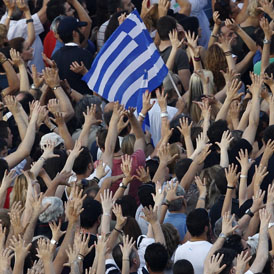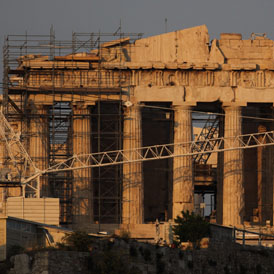Eurozone sets bailout deadline for Greece
Greece is given two weeks to approve stricter austerity measures which would ensure that it receives a further 12bn euros in bailout money from the eurozone and the IMF.

After two days of meetings, eurozone ministers have told the government of Greece it has until 3 July to endorse a new package of spending cuts, tax hikes and privatisations.
“It is clear that the (Greek) debt is sustainable, but the debt will only remain sustainable if Greece fulfils all its commitments,” Jean-Claude Juncker, who chairs the group of 17 eurozone finance ministers, announced in Luxembourg.
Meanwhile, it was reported that Chancellor George Osborne was likely set to tell the finance ministers’ meeting that Britain will not take part in a fresh bailout of the Greek economy.
Britain did not contribute to the original 110bn euro (£96.5bn) deal last year, which was assembled by the eurozone countries to help save one of their own.
The only commitment from London came from its share of an International Monetary Fund contribution, in the form of loan guarantees which would only be called in if Greece defaults.
At the time that prospect was dismissed as scare-mongering.
But with the pace of Greek deficit reduction painfully slow and the economic crisis far worse than even pessimists feared, a second bailout is now considered inevitable.
Germany and France have already signalled that there is no reason for London to pay a share of a repeat bailout, likely to be finalised within weeks and for a similar sum to the first.
And Mr Osborne was making clear at today’s talks in Luxembourg that the issue remains one for the eurozone alone.
Read more: How does Greece's bailout affect Britain?
Chief Secretary to the Treasury, Danny Alexander said: “It’s the eurozone that is taking forward discussions now about the next stage of dealing with Greece’s substantial problems.
“There’s simply no proposition on the table for the UK to contribute beyond International Monetary Fund involvement and I don’t expect there to be one.”
However, a bailout fund was set up by the EU after last year’s Greek crisis, precisely to finance future economic problems in the member states, and it involves all 27 member states.
And if a majority of the 27 vote to use the fund for a second Greek aid package, rather than repeat a eurozone-only rescue, the UK Treasury would be responsible for 12 per cent of the new loan guarantee to the Greek government.
One UK official admitted there was “theoretical risk”, but no money would be involved unless Greece defaulted.
Labour’s former foreign secretary Jack Straw said the UK needed to recognise there was a “mood change” in Europe.
He said: “If this euro in its current form is going to collapse, is it better not that it happens quickly rather than a slow death?”

On Sunday night Greek Prime Minister George Papandreou insisted his country would not default and was determined to crack down on its mounting deficit. Failure to do so would be a “catastrophe”.
Mr Papandreou faces a confidence vote in the Greek parliament tomorrow. He looks set to survive, but must then win support for tougher austerity measures then those which triggered violent street riots and which failed to revive the economy.
The talks on a second bailout follow approval last night on approving the latest slice of aid from the first Greek package – a 12bn euro (£10bn) handout desperately needed to stave off bankruptcy.
A final decision on the second bailout – and how it will be funded – is expected at more talks next month.
Europe’s Economic Affairs Commissioner Olli Rehn said today’s meeting would outline “the contents and conditions of a successor programme for Greece, with a view to taking decisions at the next meeting on July 11”.
-
Latest news
-
Police try to shut down right-wing event as Nigel Farage speaks3m

-
‘Many things Netanyahu has done I disagree with, but I’m not giving up on Israel’, says top-ranking Democrat4m

-
Could US House be about to vote on Israel, Ukraine aid bill?2m

-
Number of people out of work due to long-term sickness at record high3m

-
Creating deepfake porn to be made a criminal offence after C4 investigation6m

-




